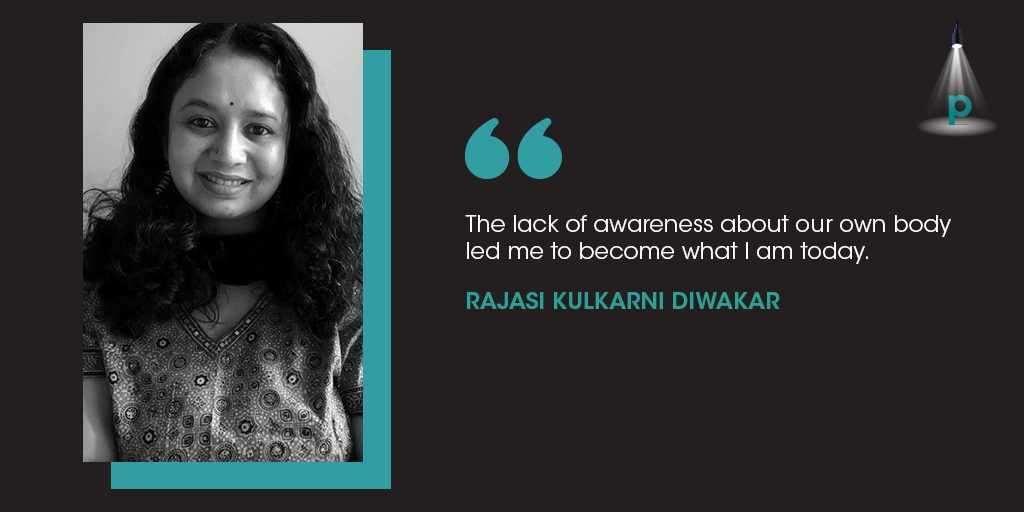Postcard Spotlight is an interview series showcasing young leaders and creative minds who are making their mark with their unique talent and drive.
In the spotlight this week is Rajasi Kulkarni Diwakar, the founder of Bleed Red Go Green and a core team member of Green the red, talking about her journey as a menstrual health educator. Read on to know her story.
Tell us about your journey. What inspired you to start your venture Bleed Red Go Green?
BRGG is a collective of like-minded people who want to work in remote areas of India as well as urban areas. Both areas need education when it comes to menstrual and reproductive health. I have been a Menstrual and Reproductive Health educator for 7+ years. I am already a core group member of PAN India collective Green the Red. My journey into this started when I moved to Chhattisgarh for a fellowship in 2013. I was designated to work with the residential school of Dantewada, and that changed me a lot in good ways. My journey towards minimalism and menstrual health education began there. Since no one picks our garbage in rural areas, it is either in our backyard or buried or burnt. This moved me. And the lack of awareness about my own body led me to become what I am today.
How does your initiative help create menstrual health awareness in rural areas?
We turned 2 in April and we are growing. So far we got to work with some volunteers, NGOs, adolescents from tribal areas, especially of Chhattisgarh and some parts of Odisha. We got to interact with teachers and understand their perspective. Before the pandemic, we used to visit schools, villages, and slums for awareness sessions and since the pandemic, we started doing this online and people all around India started joining our webinars. We have also done sessions to empower people to make their own reusable cloth pads. Recently, we helped set up a cloth pad making unit in the slums of Mumbai.
What are some environment-friendly menstrual hygiene habits that people should practise?
We have been using cloth as a menstrual hygiene product for decades. It’s the most sustainable option since it’s available at home, you don’t have to go to the market or purchase anything. It’s made of cotton, it will decompose in soil when buried/composted. However, not everyone is comfortable with that since cloth is being marketed as dirty and discomforting by multinational companies to sell their disposable products. Today, modern options like cloth pads, menstrual cups, period panties, etc. are available. They are not only eco-friendly but comfortable and convenient, too. They are reusable for many years, thus saving money, the environment and your body from rashes and harmful chemicals.
What are some of the misconceptions about menstrual health that should end?
There are plenty, but I will talk about the basic ones – the foundation. Firstly, we should stop telling children to hide their naked bodies soon after the bath. Body-shaming starts there. We keep everything under wraps and don’t let logical, scientific information about our own bodies flow. We shun the questions or discussions about our bodies as private and something ridiculous. This needs to stop from a young age. This is the reason why menstruators don’t know that they have 3 different openings down there and they don’t pee and menstruate from the same place. There are really illogical, unscientific beliefs and unrealistic expectations about the structure and composition of the body which leads to unnecessary fears about using internal menstrual products and even sexual intercourse.
What are the challenges you face running this collective, and how do you try and overcome them?
Right now, most of the team is based in different parts of Chhattisgarh and some of us are in other places. So that is one challenge. Meeting digitally has its own pros and cons. We all have different energy levels and skill sets, yet everyone brings diversity and richness to it.
The practice of menstrual segregation is still prevalent across many Indian households, with menstruators being made to follow customs that may be completely unscientific. What are some of the strangest social taboos you’ve come across in this regard, and how do you counter them?
We have heard that women can’t bathe, touch water or plants, because they are ‘impure’. Segregation is something that some people actually look forward to while some people don’t like to be held. Menstrual segregation is a ‘leave policy’ that everyone is raving about currently, but it’s dipped in misogyny, patriarchy and unscientific beliefs and lack of choice.
In our approach, we do not criticise these practices, instead, we enable participants to think critically about the taboos. Scientific information is the biggest tool to empower people with correct information about their own bodies and how they work. It slowly but certainly changes their perspectives and provides them with the means to decide what is best for them. We consistently speak about this and include other family members; not just menstruators to change the scenario.
You are a strong proponent of menstrual cups. In your experience, what are the most common concerns women face in switching to menstrual cups (or most common reasons for women wanting to, but being hesitant to switch to menstrual cups)? How do you address these?
I promote all reusable options and give people a choice to decide what works best for them. Women have fears about using menstrual cups. They think it may get lost or stuck inside. Some of them have hygiene concerns. We suggest simple, correct techniques to use these products solve also answer the concerns they have. It has a learning curve.
Which are your favourite accounts to follow on Social Media accounts and why?
Ecofemme, Thebloodyfeminist, EmbodyworkLA, Frangipanji and Rangeen Khidki.
How has Social Media helped you in building your brand and connecting with people?
Social Media has helped me meet many like-minded people. We have so many supporters. It also helped people know what we do and approach us for awareness sessions and small projects. It has also led to many great collaborations and a chance to speak for a second time at a TEDx event (feeling shy to share this).
Where can people get in touch with you?
susmenstrupractices@gmail.com is an email address to contact BRGG. We also have our Instagram handle and Facebook page.

